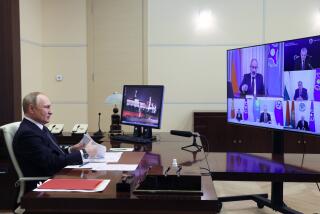Peres to Address U.N., Meet With Shevardnadze
- Share via
JERUSALEM — Israeli Foreign Minister Shimon Peres left Sunday for New York, where he will address the United Nations and meet with Soviet Foreign Minister Eduard A. Shevardnadze amid reports that Israel and the Soviet Union may be close to an agreement to establish low-level diplomatic relations.
Peres, who will also meet Secretary of State George P. Shultz, told a news conference before his departure that he will continue to press ahead on the question of an international conference on the Middle East, while noting that the Israeli government is itself divided on the issue of participation.
Peres, leader of the Labor Alignment in the coalition government, supports the conference proposal, but Prime Minister Yitzhak Shamir opposes the idea and has blocked its acceptance in the Cabinet.
Peres, who will address the opening session of the U.N. General Assembly this week, said he hopes to present a number of ideas on the Middle East peace process but indicated that the importance of the speech will be to reflect what Israel regards as an improved “tone, style and hope” for negotiating a settlement.
Peres said his talks with Shevardnadze will concentrate on the future of Soviet Jews, relations between Israel and the Soviet Union and Israel’s desire to see Moscow take a more “middle-of-the-road” approach to the Middle East question.
On the issue of relations with Israel, Peres said he does not expect a “breakthrough” but added that he hopes to achieve a “more organized relationship and a dialogue.”
He said his talks with Shevardnadze on Tuesday will “pave a road in a rather difficult scenery of mountains of suspicion and valleys of interruptions.”
Peres’ talks with Shevardnadze have aroused a great deal of speculation that Israel and the Soviet Union may be close to concluding an agreement for low-level relations after a break of 20 years.
The speculation increased last week after the announcement that Israel and Hungary would exchange diplomats in so-called interests sections, a step less than full diplomatic relations, similar to an agreement reached with Poland last year.
Also fueling the speculation was a meeting Friday in Jerusalem between Yossi Beilin, the director general of the Israeli Foreign Ministry, and Yevgeny Antipov, who heads a Soviet consular delegation that has been visiting Israel since July. It was the first time Israeli officials have had “political” discussions with the visiting Soviet delegation.
The meeting was significant to the Israelis because the Soviets had been insisting that the delegation was sent here only to check on Soviet property in Israel and to issue new passports to Soviet citizens and that the visit had no political meaning.
More to Read
Sign up for Essential California
The most important California stories and recommendations in your inbox every morning.
You may occasionally receive promotional content from the Los Angeles Times.













